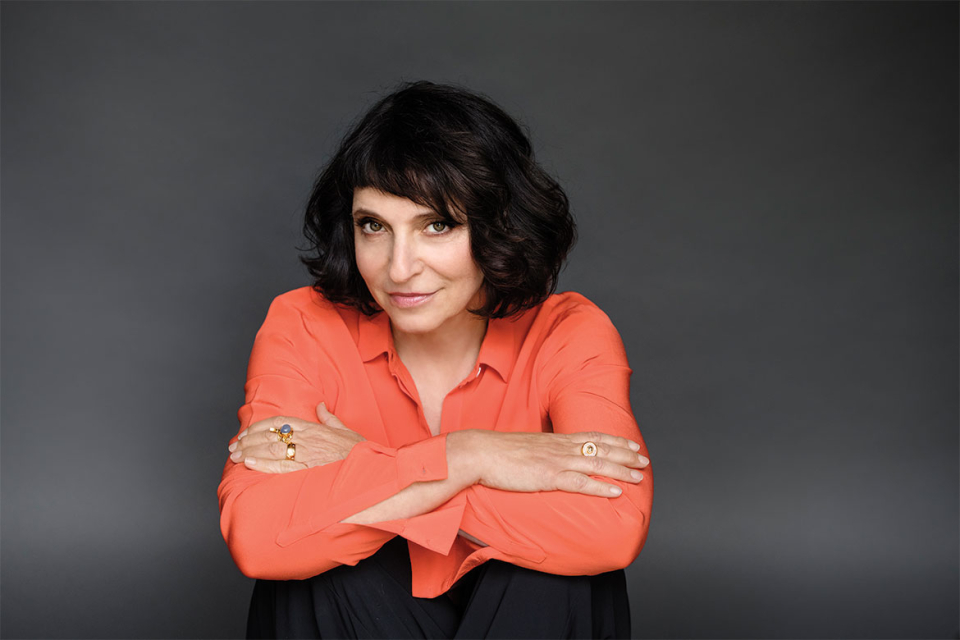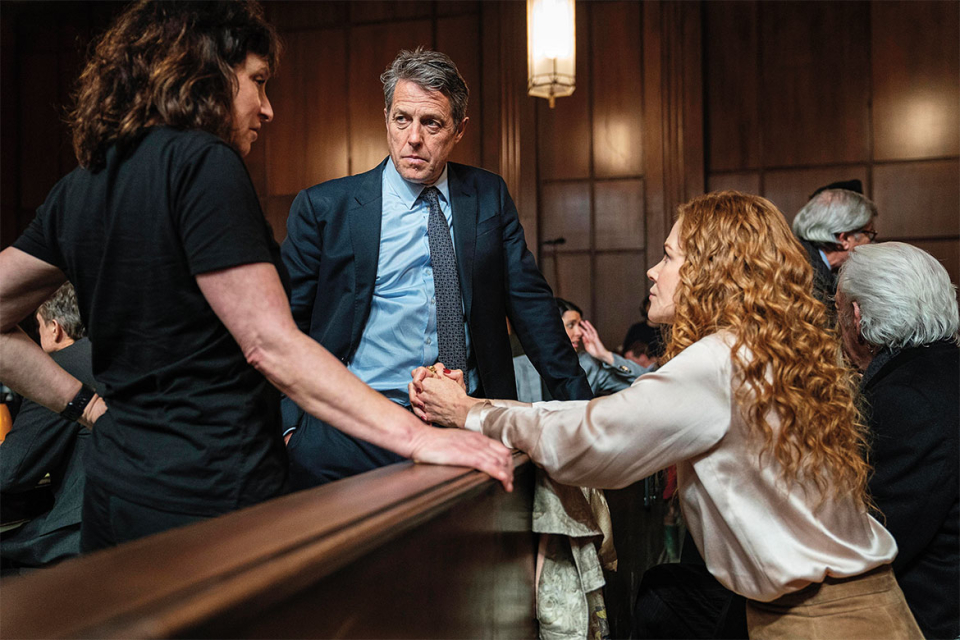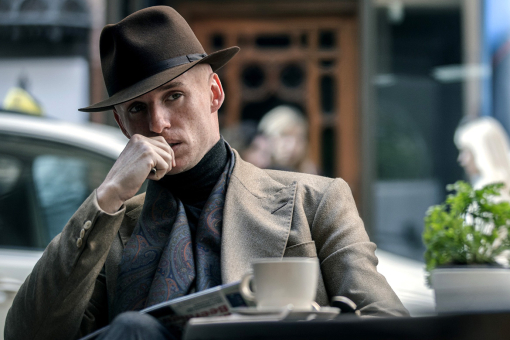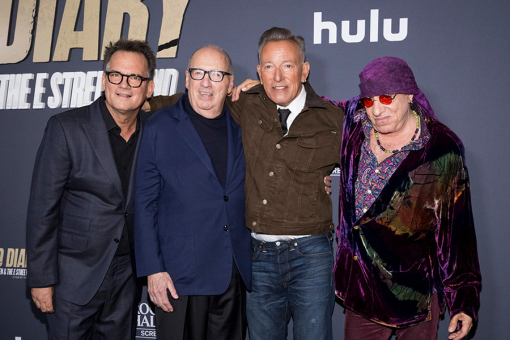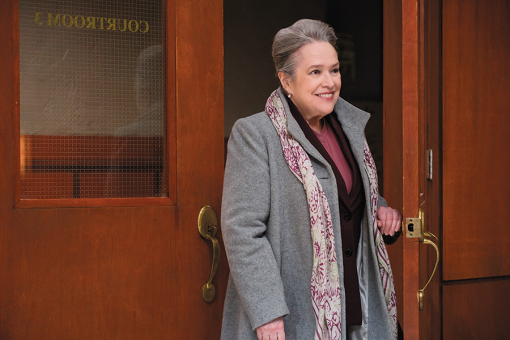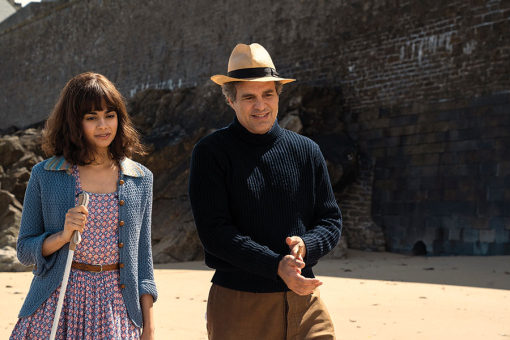The opening shot of the sky is both bleak and promising. Is it the sun breaking through clouds after a storm… or is the storm about to hit?
That nuanced image, as directed by Susanne Bier for The Undoing, instantly intrigues. In the limited series — which debuted October 25 on HBO and HBO Max — Grace and Jonathan Fraser (Nicole Kidman and Hugh Grant) have what appears to be a perfect life: he's a pediatric oncologist and she's a therapist, born to wealth. They live a rarefied existence in an Upper East Side townhouse, seem to be in love, still have shower sex and adore their only child.
Naturally, it must all fall apart — but perhaps not quite the way everyone expects.
Bier, also an executive producer, smiles enigmatically. She's exceedingly careful to not reveal spoilers, since the show reaches a stunning twist heading into its sixth and final episode.
The question is whether Jonathan has killed his lover, Elena (Matilda De Angelis), who had recently infiltrated Grace's circle of society friends. Jonathan is the prime suspect, but viewers should be wary of making assumptions.
Bier warns fans of the bestseller on which the series is based (Jean Hanff Korelitz's You Should Have Known) that her series isn't always faithful to the book.
Directing an adaptation, "You want to be impacted but not beholden," Bier explains.
What intrigued her about this story were the familial relationships. "I have a deep curiosity about where you belong, and how you belong, and this is no different," Bier says. "It is about a family and the threat to a family. In a deeper sense, family defines who we are."
This family is intriguing, if only for its wealth. Donald Sutherland, who plays Grace's widowed father, rattles around an expansive apartment in an elegant Fifth Avenue fortress.
"Like a lot of other people, I have walked in Central Park and looked at those buildings," Bier says. "And I wondered: what is that like, that impenetrable world?"
Bier's vantage, like her work, is layered. A Dane born to Jewish immigrants, she studied art and design in Jerusalem, architecture in London and film in Denmark. An attention to beautiful facades and what may lurk behind them is evident in her work.
"The notion of a blueprint for a building is pretty much how you work within a film," Bier says. "The script is the blueprint; you have to make it real." Things get very real in the interrogation room of a New York City police precinct, where Grace is confronted with details of her husband's secret life.
Kidman was already attached as a star and executive producer when HBO sent Bier the script by David E. Kelley, writer, creator and showrunner of The Undoing . Grant and Bier had been trying to work together for years. "I thought she was surprisingly scary," Grant says, probably joking, during a press crosses conference.
During the 89-day shoot, Bier was "a leader," Kidman recalls. "She completely commands the set. She is the mastermind of six hours. And that's really difficult, and she does it with such aplomb and confidence and clarity. It's just a joy to be around her."
Kidman says she, too, had wanted to work with Bier for a while, adding, "And then she really wanted to work with Hugh, and she said, 'I think you two in a marriage together would be really good.' I love that this dissects a marriage; it digs right in."
Grace has three males circling her: her son, who's old enough to be protective of his mom, yet young enough to be walked to school; her husband, whom she believed was a compassionate physician who loved only her; and her father, a man of logic and means who will stand by his daughter.
The Frasers soon find themselves in the eye of a media tornado. Naturally, it's tabloid fodder: the mother of a scholarship student at one of the city's poshest schools has been beaten to death, and another student's father is the suspect. Jonathan swears he's innocent, but his own admissions make it difficult to believe him.
"This is a thriller with a lot of depth," Bier says. "It is a thriller about a marriage, the things you don't know about a person." She lets that notion hang there a moment, and that knowing smile her face again. "I love watching a series where you are seduced into thinking one thing."
Like all tightly woven thrillers, secrets abound. "You can always find a truthful way of acting in a certain moment, even if you're hiding stuff," Bier notes. "And I think part of what is interesting about this sort of layer upon layer upon layer is the fact that you might show certain layers, but not all of them. And that doesn't mean they don't exist."
She allows the audience moments of silence to interpret action, and she gives actors latitude to improvise. Kidman "was doing something that was never there," Bier says. "And I'd never seen coming, which was thoroughly fascinating."
Lingering shots of faces, a signature Bier touch, appear throughout. "I've been fascinated, ever since I went to film school, by a close-up of a human face," she says, singling out Kidman for particular praise. "You can see everything on her face."
Bier has worked steadily since film school as a writer, producer and director. She won an Oscar in 2011 as the director of In a Better World, named Best Foreign Language Film, and an Emmy in 2016 for directing AMC's The Night Manager. Even so, she's had meetings where she thought, "They would never have spoken to a man like that."
For decades, she did what most women have done: she let it slide. But then, "#MeToo hit me on a deep level," Bier says. Now, rather than stay quiet, she speaks up if someone slights her. "Women were taught to not brag. I know I am good at what I do, but I don't have the same way of talking about it."
Confident in her art, Bier maintains, "The only way to create anything really great, the only way to do a very successful miniseries, is to have a singular point of view."
After wrapping The Undoing, she planned to recharge before tackling her next project. "As long as I feel it is irresistible, I am going to continue doing it," she says. "Awards are wonderful and gratifying, but you don't do it for that. You have got to be willing to take a risk."
This article originally appeared in emmy magazine, Issue No. 11, 2020

